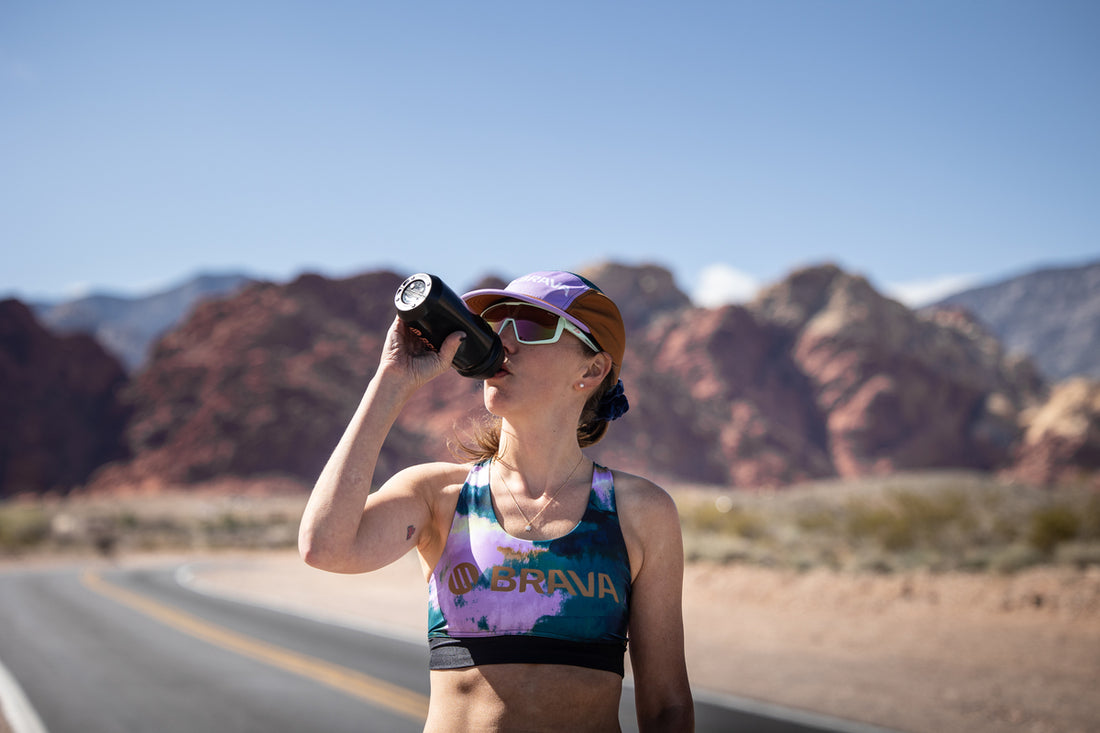“Drink more water!”
We’ve all heard this line before, but have you ever wondered why?
Water plays many essential roles in keeping us healthy including regulating our body temperature and blood pressure, lubricating joints, transporting nutrients to the cells and removing waste from the body. It is particularly important for athletes to be well hydrated as dehydration can impair your performance.
Mild dehydration symptoms can include headaches, dizziness, dry lips and mouth, increased thirst, and dark yellow urine. Dehydration leads to a pasty and uncomfortably dry mouth, increased heart rate, low blood pressure and impaired body temperature regulation, and ultimately impairs performance by increasing the perception of the effort (feeling more tired than usual!).
Dehydration is often seen in athletes who are not drinking enough fluids prior to exercising, and/or not drinking enough fluids during exercise to replace sweat losses. The feeling of thirst is a mechanism to alert us to drink more water to maintain body fluid balance. Feeling uncomfortably thirsty while exercising is a sign of dehydration, which can lead to a decrease of up to 10% on performance.
How to determine hydration needs
Several factors need to be considered: body weight, hydration status, sweat rate, ambient temperature where you will be exercising, clothing, and the activity (type, duration and intensity). The more you sweat during training, the more fluid you will need to consume to replace lost fluids.
When and what to drink during training
|
|
Water |
Electrolytes |
Carbohydrate (sports drinks) |
|
In the 2 hrs prior to exercising |
400 - 600 mL |
- |
- |
|
< 1h exercise session |
Sips of water |
- |
- |
|
1-2.5 hrs exercise session |
Sips of water |
As needed, according to sweat rate |
Yes, beneficial up to 60 g of carb / hour |
|
> 2.5 hrs exercise session |
Sips of water |
Yes, according to sweat rate |
Yes, beneficial up to 90 g of mixed carb / hour |
For long training sessions, opting for a sports drink that contains carbohydrates is a convenient way to meet both your hydration and fuel needs.
There are three popular ways to approach hydration during training:
- Drinking to thirst: rely on your thirst as a cue to drink.
- Drinking ‘ad libitum’: drink as much (or as little) as you want, whenever you want (or can) - there are no specific rules to follow.
- Drinking as per a hydration plan: plan your hydration needs ahead of time and follow that plan as closely as you can during exercise. To achieve this, an athlete could determine their estimated sweat rate by weighing themselves before and after a training session, and then build a hydration plan that dictates what volume of fluid to drink at which frequency (ex: 150 mL of water every 20 minutes). While this option may be more accurate in replacing fluid losses, it also requires more planning and has little flexibility if something unexpected were to happen during the training.
All in all, the best hydration technique is one that will allow you to drink comfortably during your training while meeting your hydration needs by preventing more than 2% body weight loss (from sweating). Just like any exercise, drinking during training takes practice - start slow and gradually increase to your goal.
A quick word on caffeine
It is a common belief that caffeine dehydrates. Is this true? Well, sort of… While it is true that caffeine has a diuretic effect (makes us pee more), this effect is mild and depends on many other factors. For those who are avid coffee drinkers, you may have built a better tolerance to caffeine, and it may not dehydrate as much. On the other hand, consuming an excessive amount of caffeine can potentially have other negative side-effects such as difficulty falling asleep leading to poor sleep and recovery, restlessness, and create gut discomfort. The key with caffeine is to consume it in moderation, and to choose water more often as the best hydration option.
Anna Ly, RD, IOC (c)
(Registered dietitian, candidate to the IOC Sport nutrition diploma) & BRAVA Ambassador
References:
- Thomas DT, Erdman KA, Burke LM. Position of the Academy of Nutrition and Dietetics, Dietitians of Canada, and the American College of Sports Medicine: Nutrition and Athletic Performance [published correction appears in J Acad Nutr Diet. 2017 Jan;117(1):146]. J Acad Nutr Diet. 2016;116(3):501-528. doi:10.1016/j.jand.2015.12.006
- https://www.unlockfood.ca/en/articles/water/facts-on-fluids-how-to-stay-hydrated.aspx
- https://www.unlockfood.ca/en/Articles/Caffeine/Facts-on-Caffeine.aspx




